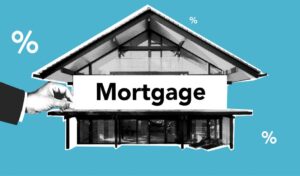When you apply for a home loan, you may be presented with a lot of different options. The option you choose will affect not only your monthly payment but also the amount of interest you pay and how long it will take to pay off your mortgage.
While a mortgage calculator can help you understand the payment by plugging in different numbers, how does the amortization actually affect a mortgage? And is it possible for your amortization to change?
Let’s take a look at mortgage amortization and its impact on one of the largest investments you’ll ever make: your home.
What Is Amortization?
Amortization refers to the length of time to pay off your mortgage. When your monthly payment is calculated, it is based on your loan amount, the interest rate, and the amortization.
You may also have heard of a mortgage term. Term and amortization can be different. A mortgage term is the length of time for that particular loan.
For example, your loan may have a 5-year term with a 25-year amortization. That means that your payments are based on what is needed to pay off your loan over 25 years. But your loan will end in 5 years: at that time, you would either need to pay off the remaining balance of the loan or renew into a new loan.
A short term can be a way to lock-in a lower interest rate for the 5-year term. At the end of the term, you would renew at whatever the interest rates are at the time.
Why Choose a Shorter or Longer Amortization?
When you choose a shorter amortization, your loan will be paid off sooner. You will pay less in interest during that time. However, because you are choosing a shorter amortization, your monthly payments will also be higher.
On the flip side, if you choose a longer amortization, you will have a smaller monthly payment but pay more in interest. Many people select a longer amortization because it makes the monthly payment more affordable.
For example, let’s say you have a loan for $150,000 at 4.5% for a 15-year amortization. Your monthly payment will be about $1,147. You will pay about $56,548 in interest over the amortization period.
If your same $150,000 loan is at 4.5% for a 25-year amortization, your monthly payment will be about $833.75. You will pay about $100,124 in interest. So you can see, you will save in your monthly payment with a longer amortization but pay more in interest.
Can the Amortization Be Changed?
You cannot change the amortization within a loan, but you can renew your mortgage into a new loan. A mortgage renewal is your opportunity to change your amortization, as well as change your interest rate. You may want to renew not only for the amortization but also to get a more competitive rate.
Another way to shorten your amortization would be to make additional payments on your loan or making payments that are higher than the minimum. If you make higher payments that are higher than required, your loan will be paid off sooner. While not technically changing your loan on paper in any way, you will have a shorter amortization by making these payments.
You can also make a lump payment to reduce the principal of your loan. If you have extra cash, you can apply it to your mortgage. Your monthly payments will not change, but you will see the loan paid off more quickly because you will owe less.
When you are looking to renew your loan term, make sure you check out the additional terms that the lender is offering you. You don’t want to be stuck with higher penalties or limited prepayment options when you renew your loan.
Does Interest Rate Affect a Mortgage Amortization?
No, in fact, the opposite is true. The interest rates are set according to the amortization you choose. If you have an adjustable-rate mortgage, the amount of your monthly payment will fluctuate with the interest rates, but the amortization will remain the same.
However, with the interest rates that are offered to you, you will typically see lower interest rates with shorter amortizations. So even though your monthly payment is higher for a shorter amortization, you pay less in interest because of the shorter repayment and because the interest rate is lower.
What Is an Interest-Only Mortgage?
With an interest-only mortgage, you pay only the interest on the loan for a specified number of years. Usually, loan payments include both principal and interest. With paying only the interest portion, your loan payment is much lower.
At the end of the interest-only term of the loan, you can either refinance the loan or begin to pay off the principal balance. The advantages are that if you need the extra money when you are first taking out your mortgage, you are paying less in the monthly payment. This can be particularly beneficial for first-time homebuyers.
Learn More About Your Mortgage Options
Ultimately, the amortization period you choose should be what makes the most sense for your financial situation. Knowing how the amortization can affect a mortgage can help you to make a decision that balances your monthly payment and how quickly you want to pay off your loan.
Whether you are buying a new home or looking to refinance, the mortgage option you choose is a big decision. You want to work with a lender that can help you find the best terms. It makes sense to re-evaluate your amortization every time your loan comes up for renewal.
At Mortgage Brokers Network, we offer a variety of mortgage solutions. Get started by applying online today.







